sf
New hypertext fiction: Standing By The Wall
By John McDaid | Wednesday, 25 September 2019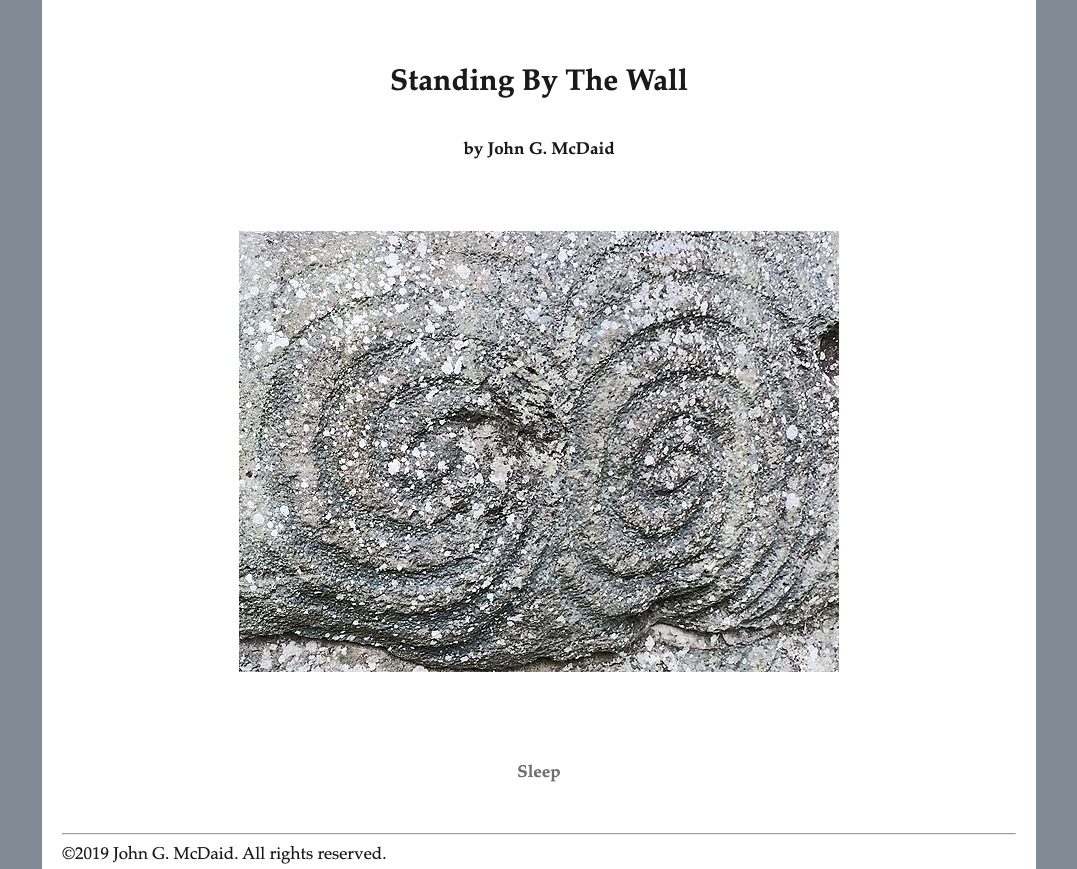 Written for the Association for Computing Machinery Hypertext 2019 "48-Hour Hypertext Challenge" (took about 30 hours), this work was displayed as part of the exhibition at the conference in Hof, Germany. You can read it at Eastgate.com.
Written for the Association for Computing Machinery Hypertext 2019 "48-Hour Hypertext Challenge" (took about 30 hours), this work was displayed as part of the exhibition at the conference in Hof, Germany. You can read it at Eastgate.com.
.
My WorldCon Dublin performance schedule!
By John McDaid | Friday, 26 July 2019 The musical performance schedule for the World Science Fiction Convention Dublin2019 has been posted, and I'm delighted to have two 50-minute concerts where I'll be playing my geek-inflected folk/filk acoustic tunes.
The musical performance schedule for the World Science Fiction Convention Dublin2019 has been posted, and I'm delighted to have two 50-minute concerts where I'll be playing my geek-inflected folk/filk acoustic tunes.
The first is Thursday night in the cool art show performance space at Point Square:
15 Aug 2019, Thursday 16:30 - 17:20, WH2 - Performance space (Point Square Dublin)
Then on Saturday afternoon at the conference center:
17 Aug 2019, Saturday 13:45 - 14:35, Wicklow Hall 2A (Dances) (CCD)
I'm putting the finishing touches on a demo album this weekend featuring most of the music I'll be playing. Look for a link soon.
More information about Worldcon available at the main Dublin2019 web site.
Arisia schedule (Panels saturday night + filking)
By John McDaid | Wednesday, 11 January 2017![]() This weekend is my favorite sf con, the always awesome Arisia in Boston. It's got something for everyone — sf, fantasy, print, film, anime, cosplay, music, the whole waterfront. By coincidence, it's at the Westin Waterfront, right next to the convention center. It's a full weekend of delightful geekery with all of the region's fandoms. I wouldn't miss it for anything.
This weekend is my favorite sf con, the always awesome Arisia in Boston. It's got something for everyone — sf, fantasy, print, film, anime, cosplay, music, the whole waterfront. By coincidence, it's at the Westin Waterfront, right next to the convention center. It's a full weekend of delightful geekery with all of the region's fandoms. I wouldn't miss it for anything.
I'm on a couple of panels (I'll also likely be hanging out in the filk room late into the night.) If you're gonna be there, hope to catch up!
Saturday, 7pm
Another Look at the Bad Old Days
Hale (3W), 7pm - 8:15pm
Jonathan Woodward (moderator), James Hailer, Heather Urbanski, Sarah Lynn Weintraub, John G. McDaid
A lot of SF has aged very badly. A lot of it bore appalling elements even for its time. There's some usual suspects, but let's look at the older works of SF with awful elements as a whole. Is there anything worth looking for in those stories? Who deserves to make problematic fave among the problematic horde? Are there lessons that are relevant to modern readers and authors to be found among the stories that make us wince?
Saturday, 8:30pm
The Prisoner at 50: Be Seeing You
Douglas (3W), 8:30pm - 9:45pm
Mark L Amidon (moderator), John G. McDaid, Michael A. Burstein, Justine Graykin, Jared Walske
Fifty years ago, *The Prisoner* helped redefine the spy genre and bring various counterculture themes of the '60s to the forefront in a groundbreaking science-fiction show. Attempts at reboots -- an '80s comic and a 2010 AMC series -- have failed to capture any of the magic of the original. What keeps this classic show so popular after so many years, and where (beyond obvious tributes like The Simpsons) can we see its influence in pop culture today?
"New York Collapse" brings artifactual richness to "The Division"
By John McDaid | Tuesday, 15 March 2016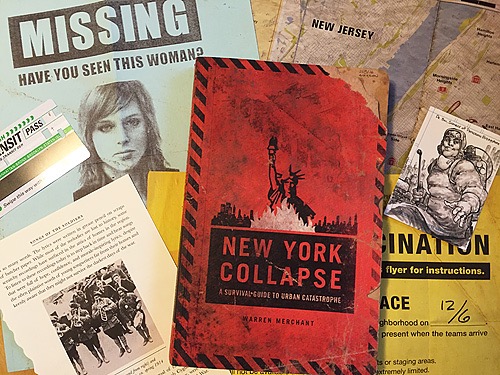
If you've been playing "The Division" since it dropped a week ago, you're probably familiar with the challenging environment of a New York City decimated by an engineered virus, quarantined from the outside world, and degenerated to lawlessness. The companion book, called "New York Collapse," offers a rich artifactual journey through the city's descent into chaos and provides tantalizing hints and lore that will enrich your gaming experience.
Written by science fiction author Alex Irvine and produced by Melcher Media, the conceit of the book is that it's an (in-universe) survival guide.
The text is ostensibly written by a quasi-spook named Warren Merchant who seems to know far too much about the particular challenges that an engineered virus — and its paper money vector — would bring to New York. On this level, the text functions as robust, 170-page guide to surviving an urban apocalypse through preparation (what to keep in your "Go Bag"), analyzing risks ("Avoid high-rises"), finding or improvising essentials (did you know you can make a solar water purifying still with a couple of plastic containers and some tubing), and urban tactics (how and where to cache materials you may need later.)
On this level, it's pretty compelling — nothing new if you're a pepper, but some good pointers, with a focus on Manhattan Island. (Near Spuyten Duyvil would be the best place to try a raft, but it's almost certain to be guarded, Merchant warns.)
But where the book really shines is in the annotations, which recount the last month since the spread of the pandemic "Dollar Bug" from the point of view of one April Kelleher. Her late husband, Bill, was a biotech researcher killed early in the pandemic under mysterious circumstances. April is trapped on Manhattan Island by the quarantine, and is forced to learn to survive, using Merchant's book. She scribbles in the margins in different colors of ink, as she finds and loses writing implements, which gives the text a recursive, palimpsestic feel (and also serves to provide chronological pegs for her observations).
And it's a pretty grim story, from the death of her husband, her struggles to find safe places to stay, her efforts to avoid the roving gangs which begin to crop up as civilization decays (the Cleaners, Rikers, and LMB you'll be familiar with from the game), and her quest to piece together an emerging mystery: Who is Warren Merchant, really? How did he know about the Dollar Bug? And why does he seem to be planting clues in the text for April to find?
You pretty soon find yourself as hooked as April, scanning the pages for embedded puzzles and clues. Some of them are obvious (odd things in illustrations) and some are subtle (Nah, Merchant is not going to make a mistake in how much a gallon of water weighs). After a couple of hours, you'll find yourself looking for patterns in capital letters and wondering if that stray green dot on page 120 is just a printing artifact.
In addition to the faux-distressed paperback guide, the package contains an array of stuffed-in objects: a map (with creases expertly printed to simulate wear and an enigmatic clue scrawled in marker), a "missing" poster of April (with a suspect phone number), a hand-drawn "trading card" of her husband, a torn-out page of a book on WWI Dutch musicians (yes, you'll figure out why), and a plastic transit fare card with holes strategically punched in the surface. (You'll need find where to put the sticky note first to figure out how to use this decoder. And, yes, it does point to something in the game.)
I'm a sucker for artifactual fictions, and this one is extremely well done, both in the multiple textual layers, and also in the high production values of the whole package. It's a captivating read with fun puzzles and an overall experience that adds significant depth to the time you're undoubtedly spending in the game itself. Highly recommended.
Full disclosure: I attended the Clarion Workshop with Alex in 1993. I purchased this book and received nothing in exchange for this review.
My Arisia schedule
By John McDaid | Wednesday, 13 January 2016This weekend, Jan 15-18, the always awesome Arisia science fiction con kicks off at Boston's Westin Waterfront hotel. This four-day event features as guest of honor the inimitable John Scalzi and offers rich, diverse programming for all sf and fantasy tastes. There are multiple tracks with sessions featuring anime, comics, film and video, gaming, science, literature, media, writing and more, plus there's LARPing and filking, an always awesome masquerade, art show, and dealers' room — all with very cool fans in a most congenial space full of cosplay and whimsy.
I'll be on a couple of panels — one on interactive fiction and one on the Terminator franchise, plus I'll be one of the presenters at the Ig Nobel readings, and I'll likely be hanging out in the filk circles late into the evenings. Hope to see you there!
5:30pm Friday
40 Years of Interactive Fiction - Gaming, Panel - 1hr 15min - Alcott (3W)
Since Colossal Cave Adventure’s release in 1976, text adventures and interactive fiction have been an important part of gaming. Now with tools like Twine and Inform 7, the genre is being put into more hands and pushed in new directions. Panelists will look at the text adventures of old and tell us where interactive fiction is going.
John G. McDaid, Caelyn Sandel, Rebecca Slitt, Carolyn VanEseltine
9:30pm Friday
Improbable Research and the Ig Nobel Prizes - Trackless events, Participatory Event - 1hr 30min - Grand CD (1W)
Highlights from Ig Nobel prize-winning studies and patents, presented in dramatic mini-readings by luminaries and experts (in some field). The audience will have an opportunity to ask questions about the research presented—answers will be based on the expertise of the presenters, who may have a different expertise than the researchers.
11:30am Monday
Terminator: Is There any Hope for Salvation? - Media, Panel - 1hr 15min - Marina 4 (2E)
Terminator Genisys was not only a (domestic) box-office bomb, it was a critical failure and a mess of a movie. But the franchise doesn’t have to be terrible; we’re only a few years removed from The Sarah Connor Chronicles, which were as well received as anything since the second movie, and there’s clearly still a ton of potential here. What, if anything, can be done to save this former A-list franchise? What went so horribly wrong with the last two films?
Bob Chipman (m), John G. McDaid, Jennifer Pelland, Santiago Rivas
Reading tomorrow night with ARIA authors in Cranston
By John McDaid | Wednesday, 23 September 2015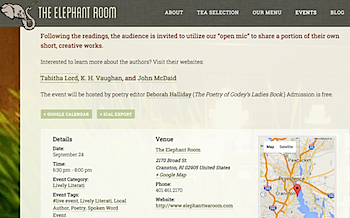 Tomorrow night, three local science fiction writers will be reading at the Elephant Room in Cranston, and I'll be one of the folks on the program. The event is part of the monthly "Lively Literati" reading series, sponsored by the Association of Rhode Island Authors (ARIA).
Tomorrow night, three local science fiction writers will be reading at the Elephant Room in Cranston, and I'll be one of the folks on the program. The event is part of the monthly "Lively Literati" reading series, sponsored by the Association of Rhode Island Authors (ARIA).
The event will feature readings by Tabitha Lord, K.H. Vaughn and yours truly, and will run from 6:30-8:30pm at the Elephant room, 2170 Broad St., Cranston. Maps and contact info on the Elephant Room web site.
If you're in the neighborhood, hope you'll consider dropping on by.
Why people leave town: thoughts on the Hugo nominations
By John McDaid | Saturday, 11 April 2015| A genuinely hilarious video (although perhaps not for the reasons intended), attributed to Vox Day. |
I live in a small town, and have spent the last ten years or so involved in small town politics. I've learned a few lessons, some the hard way. Science fiction is a small town, and in this year's Hugo nominations — the awards voted on by members of World Science Fiction Convention — I'm seeing unfortunate echoes of the way local politics can be gamed and hijacked by a small but determined group.
You may need some context; if so, you can take a peek at these posts by The Slate, Mary Robinette Kowal, N.K. Jemisin, File 770, and George R. R. Martin.
Back in the oughts, my town of Portsmouth became one of the first battlegrounds for the anti-tax crowd in Rhode Island; proto-Tea Partiers before there was such a thing. In 2006, the local "Concerned Citizens" group managed to use a procedural technique — a referendum on the local budget colloquially referred to as a "tent meeting" — to slash the budget for Portsmouth's schools and town in what was the index year for all subsequent tax levy increases. By rallying ten percent of the town's electorate, they were able to override budgets crafted by the duly elected School Committee and Town Council.
In local politics, you learn that angry people show up to vote. And it's far easier to drum up an angry mob than to communicate nuanced positions on issues.
Folks in a small town expect local government to handle things without a lot of drama. They vote for people on the Council and School Committee without necessarily a whole lot of thought about party affiliation; it's not like national politics. You may know this gal from church, or that guy coached your kid's Little League team. There's a general sense that the people running for office all have the town's best interests at heart — I mean, they're stepping up to do a several-year stint for very little pay. That assumption of good will works to an attacker's advantage.
Local elections can be swung by a few hundred votes. If you can get a core group of even 50 people riled up about an issue — in local politics, taxes are always handy (as are sewers and arsenic) and each of them reaches out to their network, you've got enough votes to change the leadership of a Council or School Committee. Not that those people, once elected, will necessarily show a lot of interest in post-partisan governance (or even, in some cases, serving out their term). They are more interested in advancing an agenda, and they will take hold of the levers of local control for a couple of years and run things into the ditch. (I say this, admittedly, as a one-time candidate for school committee who got my ass handed to me by a couple of the darlings of the anti-tax faction, so, obviously, I am biased.)
The parallels to science fiction fandom should hopefully be obvious. Worldcon is effectively a small town, albeit a temporary and peripatetic one, as it re-creates itself in a new host city every year. The same attacker's advantages accrue in voting for the convention's awards. The total number of ballots cast for Hugo nominations this year, 2,122, is the kind of number you see in a small town election. That's the kind of number you can swing with the torch-and-pitchfork crowd. Get a few hundred folks riled up about an issue — and it can be as illusory as arsenic in a landfill — and they wield an influence all out of proportion to their actual numbers, because the people of good will may not even be aware of their activities and the strength of the majority is diluted.
These are the kinds of things that can make people throw up their hands and figuratively leave town by abandoning local politics. Some people — even those who are well-intentioned — see a false equivalence and blame "both" sides.
It doesn't have to be that way.
The cynics (λυπημένος κυνικός) may win in the short term. They have absolutely scored a major victory, both in the composition of the Hugo nominations and the amount of ink and angst generated over their actions. But they underestimate the true power of small-town politics: regression to the mean. There are many more citizens than cynics, and their votes can not be gamed. The collective notion of the genre has been moving, inexorably, in the direction of more progressive, inclusive science fiction. Those of us who share that vision need to speak out, generate recognition among the majority of people of good will, and show up at the polls. That's how you overcome reactionary extremists. That's how you turn things around in local politics.
In case you're so inclined, you can get a supporting membership to Worldcon here and vote on the Hugos.
Arisia this weekend in Boston! (and my panels)
By John McDaid | Friday, 16 January 2015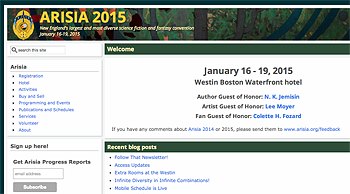 My favorite regional science fiction convention, Arisia, kicks off today in Boston, and I'm looking forward to three days of outstanding panels, great conversation, films, cosplay, an always-amazing masquerade, and just generally kicking back with a great group of sf folks.
My favorite regional science fiction convention, Arisia, kicks off today in Boston, and I'm looking forward to three days of outstanding panels, great conversation, films, cosplay, an always-amazing masquerade, and just generally kicking back with a great group of sf folks.
This year, I'm especially excited to get a chance to hear Guest of Honor N. K. Jemisin, one of sf's most brilliant new writers. In addition to her outstanding fiction, she has also been a vibrant voice for equality and diversity in the sf field (see her speeches at the 2013 Continuum and this year's Wiscon.
Oh, and I'm on a couple of panels. Looking forward to having some interesting discussions with these cool panelists.
The Medium and the Message
Hale Sun 5:30 PM 01:15
Heather Albano (mod), Thom Dunn, John G. McDaid, Sarah Smith, Alexander Feinman
A story can be told in a multitude of formats. Anything from short stories and epic poems to graphic novels and screenplays can be used to convey a narrative. How do the various formats compare? Do certain genres work well in one but not another? What about translations from one medium to another? How can you tell which works best for your story?
Does It Matter If SF Is Wrong About the Future?
Marina 2 Sun 10:00 PM 01:15
Erik Amundsen (mod), Ian Randal Strock, John G. McDaid, Walter H. Hunt, B. Diane Martin
For decades, many have believed that Science Fiction writers from Verne to Gibson were also futurists. Because of the belief that a main purpose of speculative literature is to predict the future, works are often scrutinized and criticized when they get things “wrong.” Does it matter if SF is incorrect about the future? What are writers really trying to do when they write about the upcoming years and their developments?
Doctorow's "Information Doesn't Want to Be Free" now in audiobook
By John McDaid | Thursday, 11 December 2014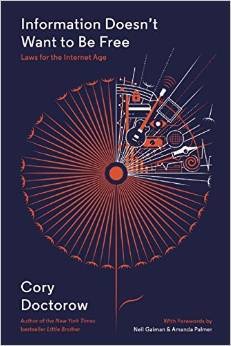 Internet activist and sf author Cory Doctorow has produced an awesome audiobook version of his latest nonfiction book, Information Doesn't Want to be Free: Laws for the Internet Age." Read by Will Wheaton, with incidental music by Amanda Palmer and the Dresden Dolls, the audiobook is available for $15 on Doctorow's web site. In an e-mail sent to his mailing list, Doctorow explained:
Internet activist and sf author Cory Doctorow has produced an awesome audiobook version of his latest nonfiction book, Information Doesn't Want to be Free: Laws for the Internet Age." Read by Will Wheaton, with incidental music by Amanda Palmer and the Dresden Dolls, the audiobook is available for $15 on Doctorow's web site. In an e-mail sent to his mailing list, Doctorow explained:
Both Amanda Palmer and Neil Gaiman contributed forewords to this one, and Will reads them, too (of course). I could *not* be happier with how it came out. My sincere thanks to Will, the Skyboat Media people (Cassandra and Gabrielle de Cuir and Stefan Rudnicki), John Taylor Williams, and to Amanda for the music.
The book is $15, is DRM free, and has no EULA -- you don't need to give up any of your rights to buy it. It should be available in Downpour and other DRM-free outlets soon, but, of course, it won't be in iTunes or Audible, because both companies insist that you use DRM with your works, and I don't use DRM (for reasons that this book goes to some length to explain).
Audio edition:
http://craphound.com/?p=5387
I've got it on the speakers right now, and it's Doctorow in classic form: informative, accessible, and very smart about the issues around copyright, intellectual property, and surviving as an artist (or, really, anyone who does stuff with their computer) in the Internet age. If you're looking for something to listen to on plane rides or car trips over the upcoming holidays, this is fifteen bucks well spent.
Here are a couple of reviews of the print version:
Wall Street Journal
Boston Globe
Full disclosure: I have known Cory for years; I paid for this book and received nothing of value in exchange for this post.